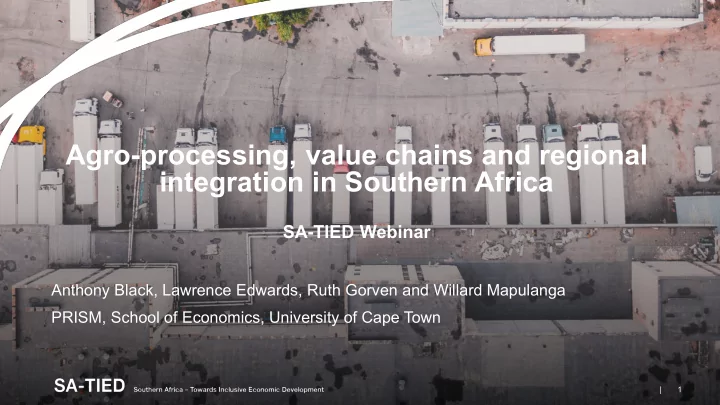

Agro-processing, value chains and regional integration in Southern Africa SA-TIED Webinar Anthony Black, Lawrence Edwards, Ruth Gorven and Willard Mapulanga PRISM, School of Economics, University of Cape Town | 1
Overview • Regional integration in Southern Africa making progress BUT…the benefits need to be spread • The case for agro-processing • What is happening with agro-processing trade in the region? • Opportunities and constraints • Supplier development | 2
Regional industrialisation and the role of agriculture and agro-processing • Agriculture as an engine for growth – Potential to add value in the agricultural sector; strong forward and backward linkages – Increasing demand for processed foods • Potential for pro-poor development – Boosts demand for agricultural products, increasing rural employment opportunities – Highly labour intensive | 3
The dimensions of agricultural/agro-processing trade 1. Growth in aggregate agricultural exports – Most countries are net exporters – Agriculture a major export product – Generally weak export growth • Only 6 out of 10 countries expanded $ exports from 2010-2017 2. Intra-regional trade – Has not grown rapidly – Very unbalanced - SA dominates (exports $3.3 bn; imports $1.1 bn) 3. Role of agro-processing – High proportion of exports are agro-processed goods – Agro-processed goods more important in regional exports • | 4
Dimensions of trade (continued) 4. Participation in GVCs Foreign value-added share by origin in exports of food by country, 2015 (%) | 5
Upgrading through integration into regional value chains? The development of local suppliers • All stakeholders have an interest in development of agro-processing regional value chains (RVCs) • What are the entry points? – Supermarketisation; large food firms? • Debate about impact of ‘supermarketisation’ on suppliers • Outward expansion being reversed? • Scepticism among business leaders about closer regional integration (e.g. AfCTFA) – Codes of conduct – Creeping protectionism | 6
Constraints on supplier development • Supplier development in SA’s neighbours? – Scale – Certification and quality – Infrastructure – Finance | 7
Modes of supplier development • Outcome has been under investment and limited upgrading • Many initiatives to address this, for example…. – Massmart supplier development fund – Namibian Retail Charter – Mount Meru Group (Zambia) – PEPZ - Value chain initiative – Muzika Zambia – market development • Addressing coordination failures and missing markets across supply chains – facilitating entry by small and medium enterprises | 8
Modes of supplier development: Nando’s PERi farms project – 937 fast food restaurants – Chillis used to be globally sourced – Now from 1400 smallholders in Malawi, Mozambique and Zimbabwe – Extension services; prices and contracts directly with farmers • Implications for addressing market failure in the development of suppliers? | 9
Conclusion and Policy Recommendations • RVCs create potential in the region but are no silver bullet • How to drive industrialisation without resort to protectionism? – Improved regulatory and investment environment; greater support for agriculture; better infrastructure; easing border controls etc. – SA government – genuine ‘developmental regionalism’ agenda e.g. infrastructure, easing cross border investments, opening its market to the region – Neighbouring governments – improve operating environments, avoid protectionism, codes of conduct can work – Large regional firms – far sighted approach to establish regional supplier base – International agencies and donors - align support to incentivise investment in supplier base e.g. partnering, feasibility studies, finance for small suppliers – . | 10
Recommend
More recommend